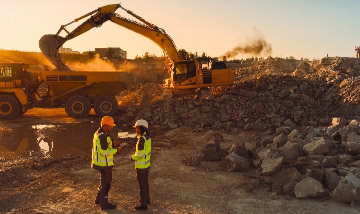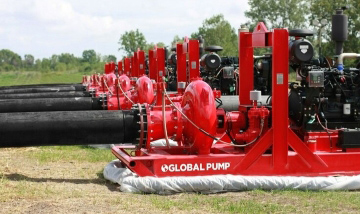Professional Dewatering Services
Construction sites range from roads and bridges to homes and buildings, and they can be a challenging work environment. With the help of ICD and Global Pumps, keeping your construction site safe and progressing efficiently is easy.
Construction dewatering is the process of extracting water from a construction site, which enables the soil to dry thoroughly, an essential step before initiating any excavation or foundation-laying activities. The drying process not only simplifies the manipulation and management of the soil but also substantially improves the overall safety and productivity of construction efforts. Implementing dewatering techniques is imperative to avert complications associated with water, which can cause project delays, increase costs, and create risks to future structural integrity.



In the construction and engineering fields, managing water effectively is crucial to ensure the success and safety of various projects. Dewatering during excavation is a fundamental step that involves implementing strategies to remove water and guarantee a dry site, which is essential for safe and efficient construction work. Lowering groundwater levels through drainage wells and wellpoint systems is a common practice to stabilize construction areas and reduce potential hazards. This approach is critical in tunnel construction, where dewatering techniques are applied to manage water ingress and prevent delays.
Building construction relies on dewatering to ensure foundations remain dry, safeguarding the structure’s integrity. Similarly, dam construction projects require meticulous water management to maintain structural integrity and ensure worker safety. The construction of bridges presents its own set of water-related challenges, with dewatering practices being vital to address these issues effectively.
The installation and maintenance of sewage networks demand drainage solutions to support the system’s construction and ongoing operation. Pipeline construction and maintenance are no different, with dewatering methods being used to lay and maintain pipelines efficiently. Bypass systems are often created to divert water temporarily, facilitating construction and maintenance activities without water interference.
Flood control measures are essential for managing and mitigating the impact of floodwaters, protecting both construction sites and existing structures. Maritime construction projects face unique water management challenges, requiring specialized strategies to ensure project completion. Managing stormwater runoff is critical in urban and construction areas to prevent flooding and erosion, necessitating the implementation of effective control systems.
Finally, quarry operations in construction utilize dewatering techniques to manage water, allowing for the extraction of construction materials without water-related complications. Across these varied applications, the fundamental goal remains the same: to control water effectively, ensuring the safety, integrity, and timely completion of construction and engineering projects.
Construction dewatering plays a pivotal role in ensuring construction projects’ efficiency, safety, and success. This process significantly enhances soil stability, creating a firmer foundation for construction activities. By removing excess water, dewatering prevents the risks associated with waterlogged sites, such as soil slippage and the potential collapse of excavation walls, thereby safeguarding the project’s structural integrity and the construction workers’ safety.
Dewatering improves working conditions by facilitating the movement of machinery and personnel, enabling construction to proceed smoothly and without interruption. This helps maintain the project schedule, particularly after adverse weather conditions, and mitigates potential delays, contributing to overall project cost-effectiveness. Dry conditions are essential for properly handling and curing construction materials, preventing water damage and ensuring the quality and durability of the construction.
Adhering to environmental and safety regulations is crucial to construction projects. Effective dewatering strategies help in managing sediment and erosion, preventing the spread of contaminated water, and maintaining a safe and compliant construction environment. Ultimately, the strategic application of dewatering techniques results in significant cost savings, compliance with regulations, and the ability to employ a broader range of construction methods, underscoring the process’s importance in contemporary construction practices
At ICD Group, our dewatering mining services and equipment demonstrate remarkable reliability, delivering durability and superior performance as crucial factors to keep your worksite safe and operable. We are conveniently based in Fort McMurray, AB, Hinton, AB, and Smithers, BC. For more information, call us at (587) 624-0828.
Dewatering is extracting water from solid materials or soil through methods like wet classification, centrifugation, and filtration. This technique is commonly used in construction to remove excess water from soil, hardened concrete, or other materials. It allows for the reuse of construction resources and improves the site’s stability. Dewatering also plays a crucial role in assessing soil suitability for building projects.
In some cases, the dewatered material forms a mixture known as “slurry,” where water and solids are so closely integrated that separation through filtration or centrifugation is ineffective. Due to its high water content, slurry often requires pumping for transport.
Dewatering is essential in various industries beyond construction, including mining and wastewater treatment. It is frequently utilized after heavy rainfall or flooding to manage water levels and can also be employed to remove water from structures slated for demolition.
Dewatering is meant to extract water from materials or structures, making them safe for reuse or disposal. Without dewatering, many materials could become unusable or present safety risks.
Dewatering serves several important functions, such as:
Dewatering is a crucial step in various processes, and it can significantly impact project outcomes and the environment.
Dewatering on a construction site offers numerous advantages, beginning with enhanced worker safety by removing potentially contaminated water and reducing the risk of slips and falls. It also ensures a stable soil and work area, preventing issues like mudslides, unstable foundations, and equipment bogging, which are critical for successful excavation and cement footing.
By preventing these challenges, dewatering helps avoid unnecessary delays caused by flooding or equipment failure. Additionally, it prolongs the lifespan of construction equipment by removing moisture that could lead to damage. Furthermore, effective dewatering is environmentally friendly, as it mitigates the environmental impact by preventing soil erosion and managing contaminated water safely.
Several methods are commonly used for dewatering, each with distinct advantages and disadvantages.
One approach is channeling, which involves excavating a trench lined with filter fabric. Water is pumped out of the trench and discharged into a drainage system. Another widely used and cost-effective method is sump pumping, where groundwater seeps into the excavation area and is collected in sumps before being pumped out.
The well-point method involves installing a series of wells around the excavation site. These wells are connected to riser pipes linked to a single vacuum pipe with a header pump. Once the water is treated to remove contaminants, it is discharged from the site.
The deep well-point method is used for deeper excavations. This technique involves lowering the groundwater level below the excavation by drilling boreholes and using submersible pumps. Wells surrounding the excavation allow groundwater to flow downward, effectively lowering the water level within the area.